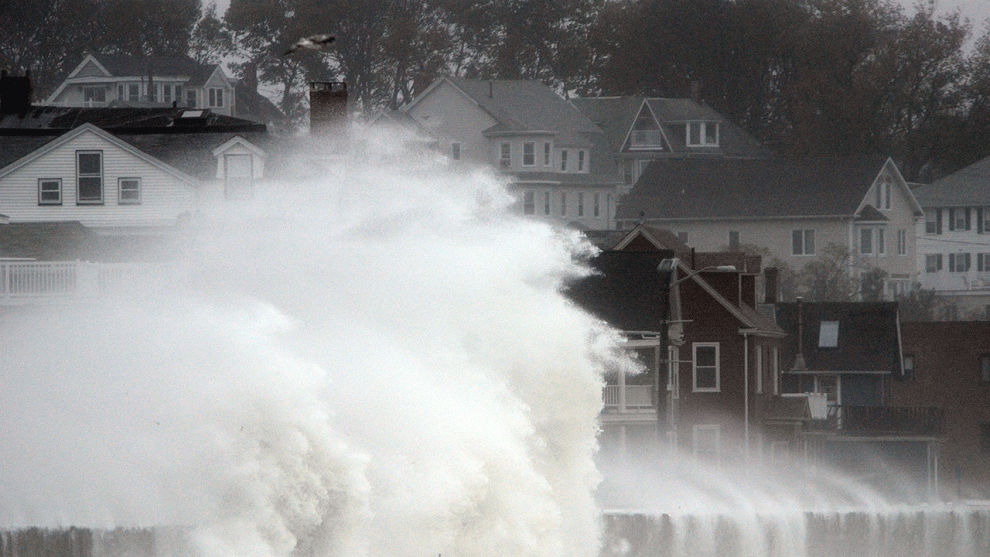Extreme weather can come quickly and aggressively, causing heavy destruction and high death tolls.
Certain states, such as Florida, are more likely to be struck by hurricanes than others, and Texas is more likely to see a tornado than Ohio. However, deadly storms have hit other areas of the country and done historical damage to homes, cities and American lives.
These 10 storms are widely regarded as the deadliest in U.S. history.
HOW STRONG CAN HURRICANES GET? HERE’S A BREAKDOWN OF CATEGORIES AND THE SAFFIR-SIMPSON WIND SCALE
On Sept. 8, 1900, the deadliest hurricane in U.S. history ripped through Galveston, Texas.
The Category 4 hurricane saw storm surges of 8 to 15 feet, and winds up to 140 mph.
The Great Galveston Hurricane, also called the Great Storm of 1900, claimed the lives of 8,000, according to the National Hurricane Center (NHC) and left over 10,000 homeless.
After the storm passed, reconstruction efforts included raising city buildings, as well as the construction of a seawall along the coast.
A brutal Labor Day hurricane left its mark on the Florida Keys.
STORM SURGE DURING HURRICANES: WHAT ARE THEY AND HOW CAN YOU PREPARE
This storm hit the Florida Keys in September 1935. At the time, the area was filled with working World War I veterans.
The hurricane claimed the lives of at least 485, and 260 were World War I veterans, according to the Library of Congress.
This was the first Category 5 storm to hit the United States in recorded history, according to the source.
This hurricane affected southern U.S. areas, as well as Puerto Rico. Most of the destruction occurred in areas surrounding Lake Okeechobee, Florida in September 1928.
The lake experienced a storm surge of around 10 feet, according to the National Weather Service.
HOW CHANGES IN WEATHER IMPACT CARS: THE CHALLENGES YOUR VEHICLE MAY FACE IN EXTREME HEAT VERSUS COLD
According to the source, the official death toll from this hurricane was 1,836, with most of the victims in Florida.
Hurricane Katrina left a lot of damage in its wake, mostly due to flooding.
This storm occurred in August 2005, and affected much of the Gulf Coast, specifically New Orleans. Eighty percent of the city was left underwater due to the storm, according to the George W. Bush Library.
There were 1,833 reported deaths due to the storm, according to the source, and $161 billion in damages.
The small fishing community in Jefferson Parish, Louisiana, suffered from death and destruction left by this October 1893 hurricane.
The Category 4 hurricane killed around 2,000 total, primarily due to storm surge.
HURRICANE WARNING VS. HURRICANE WATCH: HERE’S THE DIFFERENCE
About half of Cheniere Caminada’s residents were killed in the storm.
This south Florida hurricane caused $26 billion in damage, according to the National Weather Service.
It hit the state in August 1992, and was labeled a Category 5 hurricane.
Winds of up to 165 mph were recorded during the storm, according to the source, which caused most of the damage.
Hurricane Sandy rocked the East Coast in October 2012. Damage occurred in many states, including New York, Connecticut and New Jersey.
There were over 600,000 homes impacted by Hurricane Sandy, according to National Geographic. The storm left 8.2 million homes without power, the U.S. Energy Information Administration reported.
The Great Miami Hurricane was a Category 4 storm that took 372 lives, according to the National Weather Service. Per the source, there were over 6,000 injured persons due to the storm.
The storm hit Downtown Miami and Miami Beach in September 1926, causing $105 million in damages.
The Sea Islands Hurricane was a deadly storm that hit Georgia in August 1893.
This particular storm saw 120 mph winds and a 16-foot storm surge, according to the New Georgia Encyclopedia.
There were 2,000 killed in this storm and 30,000 were left without homes, according to the source.
August 2017 brought Hurricane Harvey to Texas.
This storm left 338,00 in the dark, according to the North American Electric Reliability Corporation.
The Category 4 hurricane saw wind speeds over 140 mph and a storm surge of 12 feet, according to Fox Weather.
























